My heart goes out to the long-spine porcupinefish
He is freakishly adorable, but has trouble making friends
My husband Andy, as I may have mentioned before, could make friends with a rock. His uncanny ability to build community with a handshake and a smile is a huge asset to us as we travel—a skill on par with his giftedness for engineering, technical design, and mechanical problem solving. As we prepare to ferry across the Sea of Cortez from La Paz to Mazatlán, and start our drive across mainland Mexico, we will rely on his smiley superpower to smooth our path. After all, we’ll be passing through large swaths of territory that are labeled on U.S. State Department maps with decorative shades of yellow, orange, and red.
In addition to the many new friends we’ve made, we have met a fish down here in Mexico who looks friendly enough—at least initially. Like my husband, this fish wears an amiable expression. To support his nocturnal feeding habits (the fish, not Andy), he has cartoonishly big, sparkling eyes. Honestly, it’s one of the cutest fishy faces I’ve ever seen.
He’s lives a solitary life and is not a fast swimmer, but he’s agile with his five little fins, so generally-speaking, he quickly slips into rock crevices or mazes of coral if danger is present. But if this dude is out in open water with nowhere to hide and feels legitimately threatened, he doesn’t mess around. In an instant, he can transform from Disney-esque to highly unapproachable.
Meet the diodon holocanthus, commonly known as the long-spine porcupinefish.
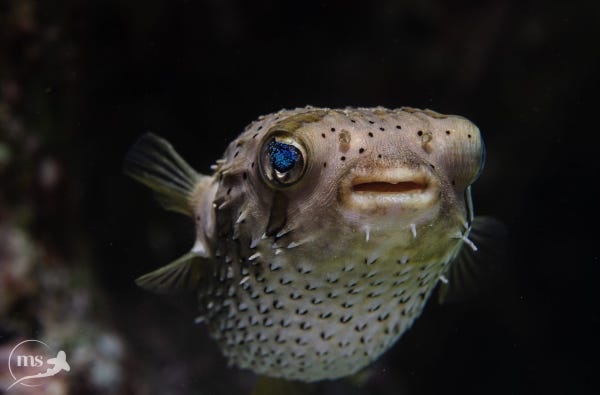
The long-spine porcupinefish is covered with—as you might have guessed—long, sharp spines. Like some kind of saltwater hedgehog, the spines lay fairly flat and close to his body when he is calm, but when he’s alarmed and has nowhere to hide—boy-howdy—his demeanor changes dramatically. He quickly breathes in a bunch of water, ballooning himself to three times his natural circumference until he resembles some sort of nightmarish five-finned rugby ball. When this happens, his spikes stick out straight and stiff in every direction, like the hair of an iconic 80’s punk rocker—you know—the one whose face features several uncomfortable-looking safety pin piercings and who is rarely seen without a studded leather jacket emblazoned with a Union Jack. Both the mohawk-sporting headbanger and the long-spine porky fish are skilled at appearing dangerous and antisocial when they feel the need.
This particular sea dweller also happens to be poisonous, just like most of his other cousins in the puffer fish family. Those spines contain highly toxic substances, as does the flesh of the fish. Even though full-grown adults never get very big, 10-20 inches long, they are only preyed upon by the heartiest predators whose digestive tracts can handle the spikes and toxins—orcas and sharks; tuna and barracuda; seals and sea lions. Everyone else is smart enough to give porkies a wide berth.
Unfortunately, all the long-spine porcupinefish I’ve encountered here in Mexico have met an unexpected demise, that of an accidental and unnatural predator. During shrimping season—which it is down here right now—the wide nets cast for gathering shrimp at night also catch anything else swimming nearby. All marketable fish are set aside to sell to local restaurants, but the porcupinefish and other puffers are untangled from the nets and tossed back into the sea. Only a handful of skillful chefs globally know how to prepare them for the table, delicately removing their spines and poison glands in a way that won’t kill their dinner guests. The average fisherman—or shrimper—has no market for the poky porkies.
Often, however, they’re not untangled and discarded until too late for them to survive the ordeal. During shrimp season, then, the beaches in shrimpy areas are littered with the bodies of these spiny fish, most of them inflated to their maximum PSI. It is obvious they died in a panic, unable to escape, and deploying the only defense they have; but it wasn’t enough. There are so many in some places at this time of year that it is important to wear sandals on the beach. Stepping on a partially buried carcass would be unwise.
While we were camped out on some dunes across from La Paz recently, I spied a white roundish object floating on the surface of the sea, about fifty meters out. My guess was correct. It was a poor puffed porky. As the tide slowly brought his body toward land, I followed the current down the beach, then watched as the waves rolled him up onto the shore, bloated belly side up.
I studied him for a long time, my heart unsure if I was more fascinated or sad. His little body, about ten inches long, was in perfect condition, unlike the others I’d found on the beach. I knew better than to handle him manually, but I did roll him over with a stick so he wouldn’t be upside-down, undignified. But the next wave flipped him right back over.
Shore birds would come soon enough and eat his big blue eyes. His body would quickly deteriorate and become nothing more than decomposing litter like the others.
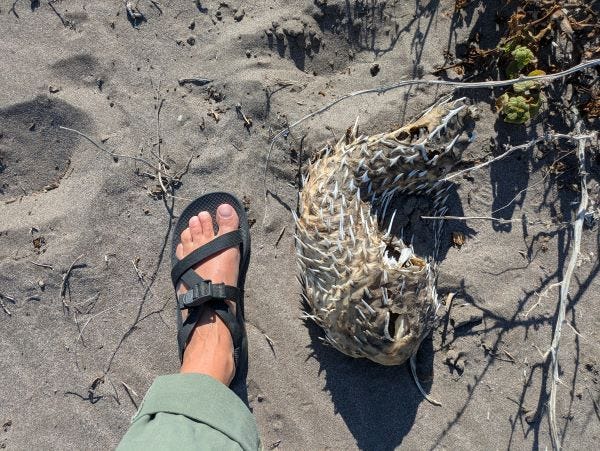
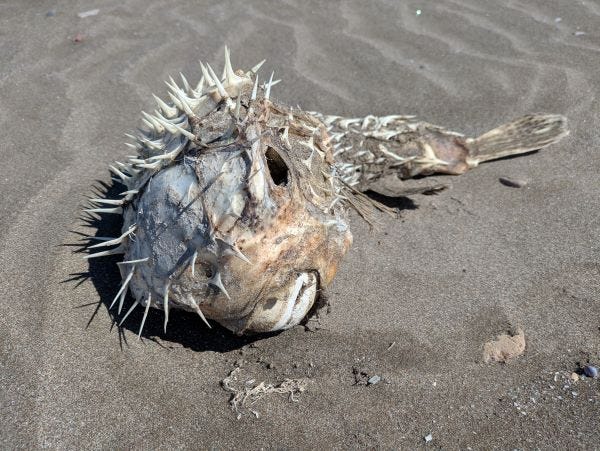
The wind will eventually bury my perfect little porcupinefish in the dunes, then, like so many others that have gone before, it will break down completely, adding a little more grit to the sparkling dark sand.
I’m honestly not sure why I was so very fascinated by the sweet-faced porcupinefish that washed up on the beach that day. Do you ever have those moments where you know there is deep significance in something you observe, but you can’t quite put a finger yet on what it is? It was one of those moments for me.
All I know is this: we can and will make friends as we go. Andy is unusually skilled at this, and it has helped us time and again. But sometimes friendship is not enough. We don’t carry firearms or other weaponry. Even if we were armed to the gills, it might not be enough. As we can learn from the long-spine porcupinefish, the best defenses are ultimately not sufficient to protect us from the dangers of life. Even those who live to a ripe old age eventually succumb to something. Whether we are in the United States or Mexico (or Zambia or Cambodia or Australia), we do our best to be smart, but the chips will fall where they may.
It’s somewhere between Murphy’s Law and the wisdom writings of King Solomon in the book of Ecclesiastes. Maybe you know the latter best from the words of Pete Seger’s 1959 poignant retelling (later recorded by The Byrds):
To everything, there is a season, and a time to every purpose under heaven.
Everything could go south at any time, and as Murphy points out, eventually it will.
Where does that leave us in the here and now? It leaves us exactly where we are—in the here and now. We don’t know the future and we refuse to live in fear.
We’ve had many great conversations in the past month with lots of other people who drive mainland Mexico regularly and frequently, and 99% of them are absolutely smitten with the region. We will drive it despite what the U.S. State Department warning maps say and what we hear in the American news—the dire media reportings with their clandestine motive of capturing market share.
Although we’ve been out of our homeland for over a month now, we read about all the chaos back in the States with the new administration and the attempt to govern by executive order, ignoring the role of Congress as the law-making body and the checks and balances built into our Constitution. Is it scary? Yes, it is. Are our LGBTQ children in danger now more than ever before? Yes, they legitimately are, and we are already seeing the impact.1 Does it concern us? Yes, absolutely. Will we be paralyzed by fear and worry? No, we won’t. We will move forward—into mainland Mexico, and into the future of the United States as we know it.
We can’t control everything. But for us, like a friendly-faced long-spine porkyfish, we will make friends whenever and wherever we can, defend ourselves when we must, and accept the fact that bad stuff might happen anyway.
Eventually, we will meet our demise one way or another, but we won’t let the fear of the ultimate end keep us from embracing life now. We won’t let it keep us from exploring this incredible world of sensory fascinations—sights and sounds, smells and textures and flavors. We won’t let it stop us from meeting and forming friendships with people—people like us, people different from us, all of them people made in the image of God and deserving of dignity.
We are not afraid.
Until next week,
Sherry
Both of our kids are transgender. One of them was fired from her job the day after the inauguration—without any explanation or any kind of warning. She just showed up to work one day and was informed she’d been let go. After maintaining perfect attendance and only glowingly positive performance reviews, as well as the oft-communicated respect of her colleagues, it came as quite a shock. With protections against discrimination removed, however, there is little recourse. She is now struggling to make ends meet. Here is a link to a GoFundMe she set up for her car repair. Please consider donating TODAY as a way to show yourself, our daughter, her very nervous LGBTQ community, and the world at large that we still care about our fellow human beings, regardless of what our current administration says. As Jesus pointed out so clearly in His teachings, loving our neighbor is all about loving people different from us—not only the people who are in our immediate close circles. Let’s live in love, friends, not in fear.




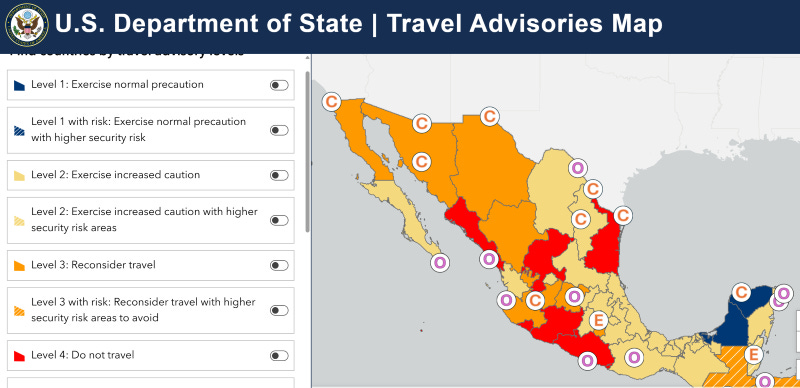
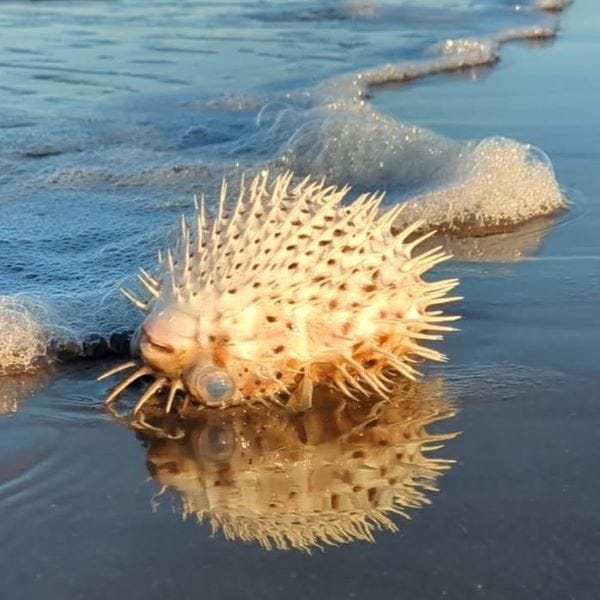
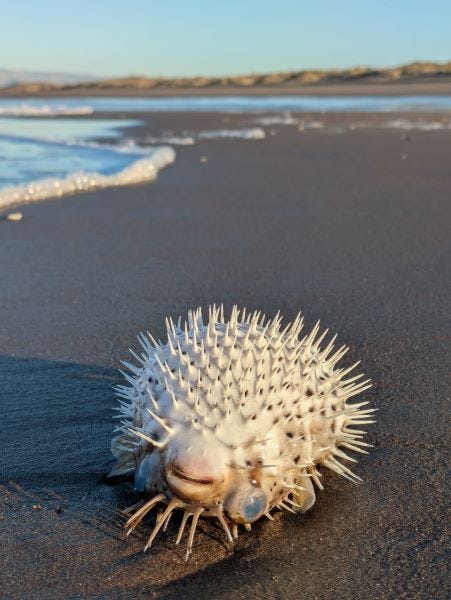
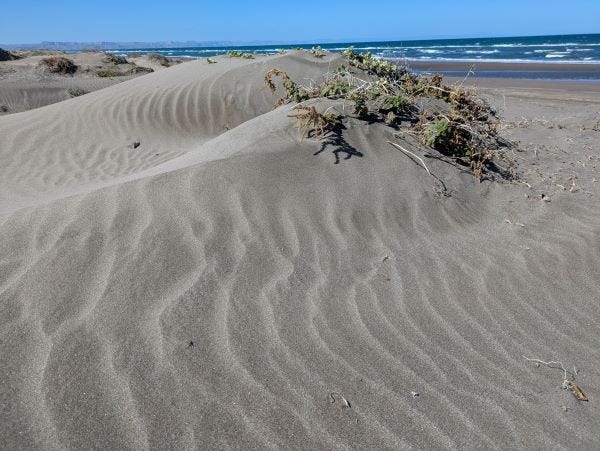
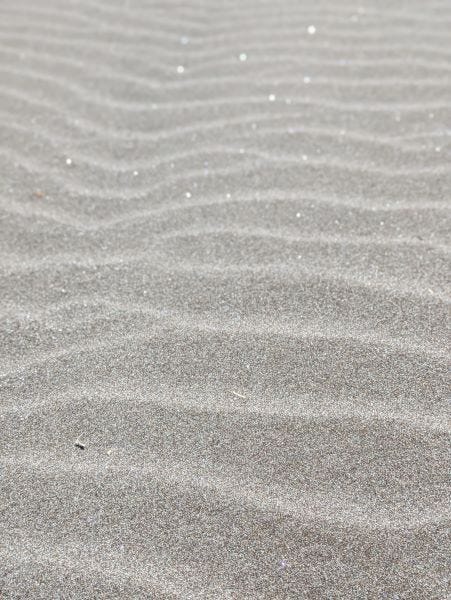
Praying for your safety and for your kiddos too. 🧡🙏🏻
I'm so sorry to hear about your daughter. That's really terrible.